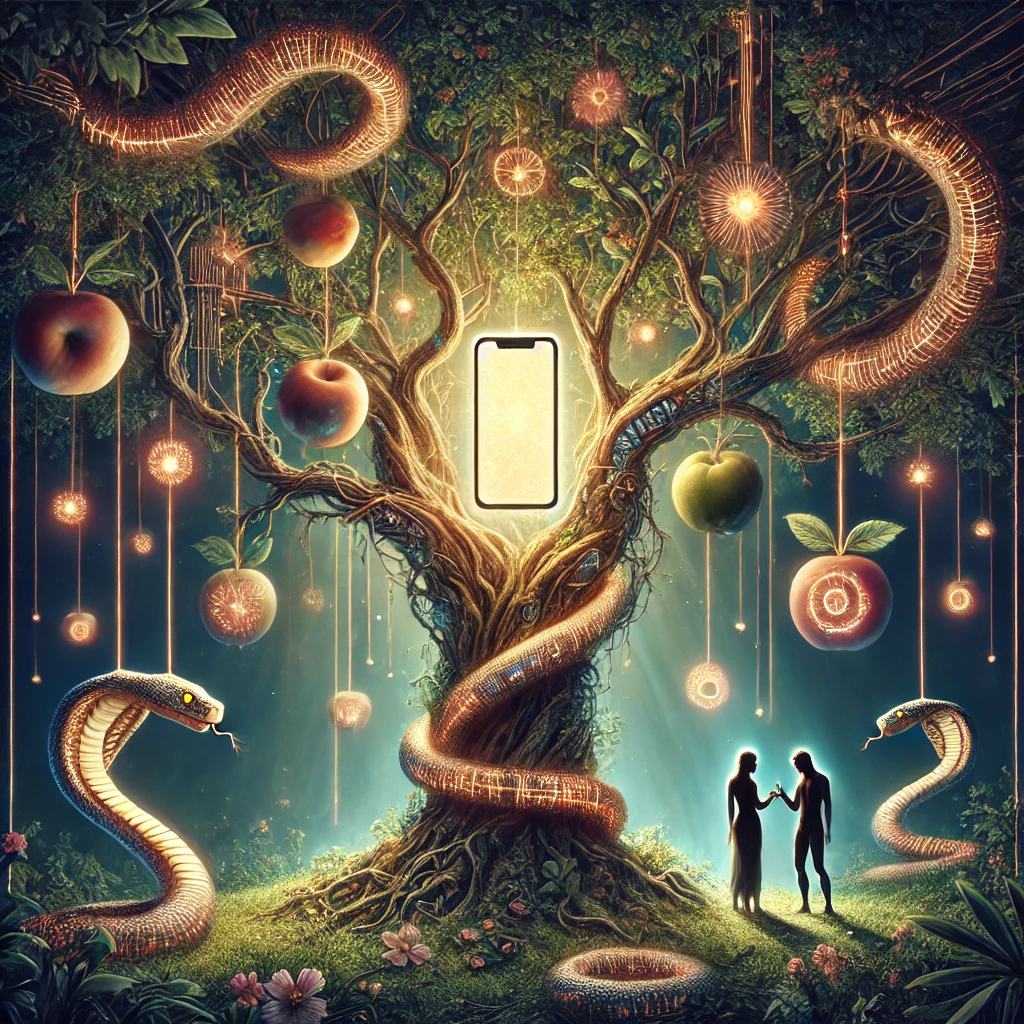
A modern take on the Garden of Eden, where a glowing smartphone symbolizes the forbidden fruit, and data-stream serpents embody digital temptation.
Introduction
From the story of Adam and Eve in the Garden of Eden to the smartphone in your hand, humanity has always grappled with the allure of knowledge. In Genesis, Adam and Eve were tempted by the Tree of the Knowledge of Good and Evil, seeking wisdom but finding ruin. Today, technology and the knowledge of good and evil are intertwined, as smartphones and digital tools have become a modern “forbidden fruit,” offering infinite access to information while often leaving us spiritually disconnected and overwhelmed.
The striking resemblance between the knowledge of good and evil and our modern technologies is undeniable. Smartphones—symbolized by an apple logo with a bite—mirror the ancient temptation to reach for knowledge beyond our limits. With every swipe and tap, technology challenges us to consider whether our relentless pursuit of information and power leads us toward enlightenment or deeper exile. In this digital age, technology and the knowledge of good and evil stand as reminders that some temptations may promise freedom but deliver spiritual and emotional burdens.
The Allure of Omniscience: Technology and the Quest for Power
n the Garden of Eden, the serpent enticed Eve by promising that eating the fruit would make her “like God, knowing good and evil” (Genesis 3:5). Today, technology and the knowledge of good and evil reflect a similar promise: omniscience through instant access to global information. A smartphone delivers answers to nearly any question, satisfying our craving for control and understanding. Yet, this pursuit of “omniscience” often overwhelms rather than enlightens, mirroring the consequences faced by Adam and Eve.
The consequences of consuming too much information are profound. Studies have linked excessive screen time and information overload to anxiety, depression, and decision fatigue. While Adam and Eve sought to gain wisdom through the Tree of the Knowledge of Good and Evil, their act of defiance left them more vulnerable. Similarly, our dependence on technology for answers often erodes our ability to discern, leaving us spiritually unfulfilled and emotionally exhausted. This parallel between technology and the knowledge of good and evil serves as a cautionary tale about the limits of knowledge without wisdom.
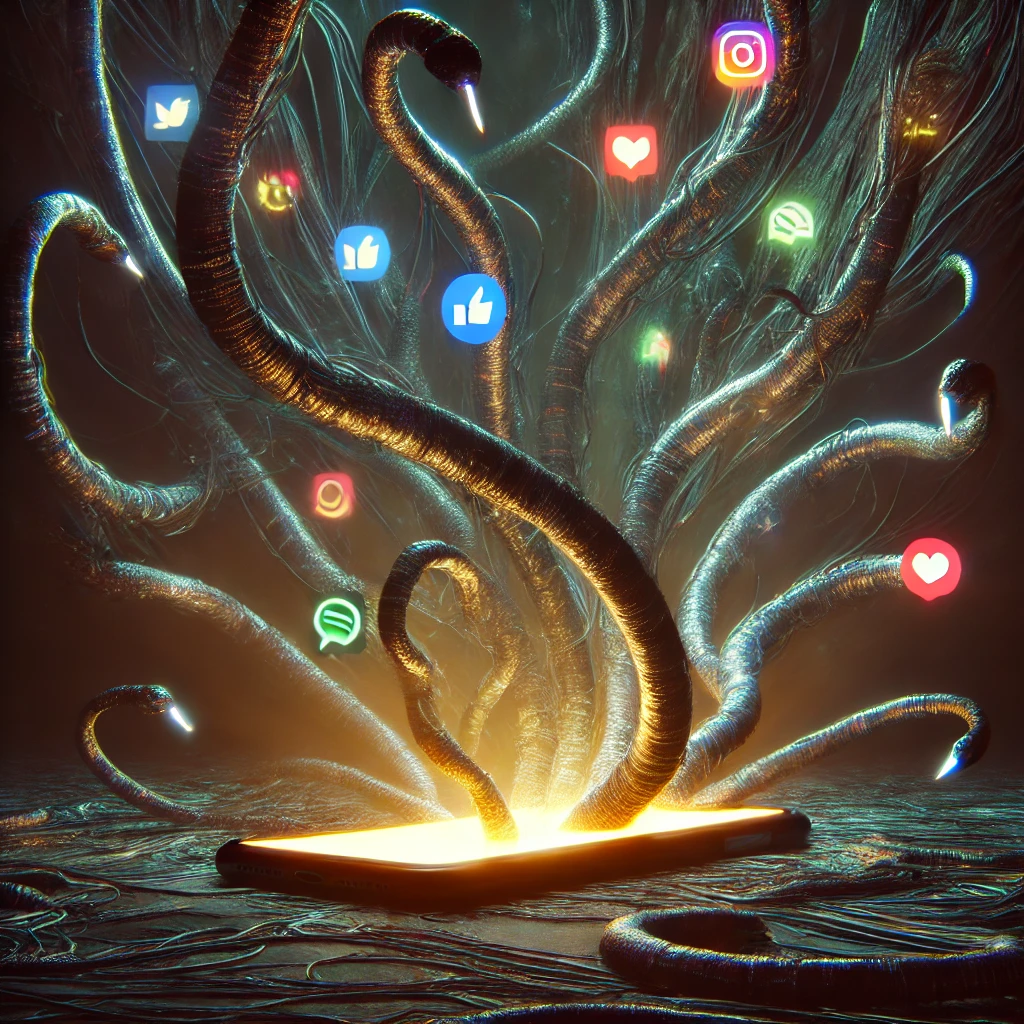




The Serpent in the Code: Temptations in the Digital Garden
The serpent’s whispers in Eden find their modern counterpart in the endless notifications and algorithms of our digital devices. Today, technology and the knowledge of good and evil intersect in the way social media platforms and apps are designed to lure users into prolonged engagement. Carefully curated notifications and content act like the serpent’s deceptive half-truths, promising fulfillment but often leading to distraction and dissatisfaction.
Social media, in particular, has evolved from a tool for connection to a source of envy, comparison, and self-doubt. Each notification is a whisper, urging us to scroll further, post more, and chase validation. Much like the serpent enticed Eve by twisting God’s truth, technology and the knowledge of good and evil reveal how modern tools often distort our perception of reality. These digital temptations draw us away from meaningful relationships and spiritual grounding, leaving us isolated and unfulfilled.
Shame and Exposure in the Digital Age of Knowledge
After eating the forbidden fruit, Adam and Eve experienced shame, realizing their nakedness and attempting to cover themselves with fig leaves (Genesis 3:7). In today’s world, technology and the knowledge of good and evil manifest this dynamic on social media, where we carefully curate our lives for public consumption while concealing our vulnerabilities.
Social media fosters a culture of constant comparison. Every scroll exposes users to idealized versions of others’ lives, fueling insecurity and envy. Much like Adam and Eve hiding from God, many retreat into isolation, ashamed of not measuring up to the polished online personas they encounter. This parallel between technology and the knowledge of good and evil highlights how the digital garden’s promise of connection often leaves users feeling more disconnected and spiritually exposed.
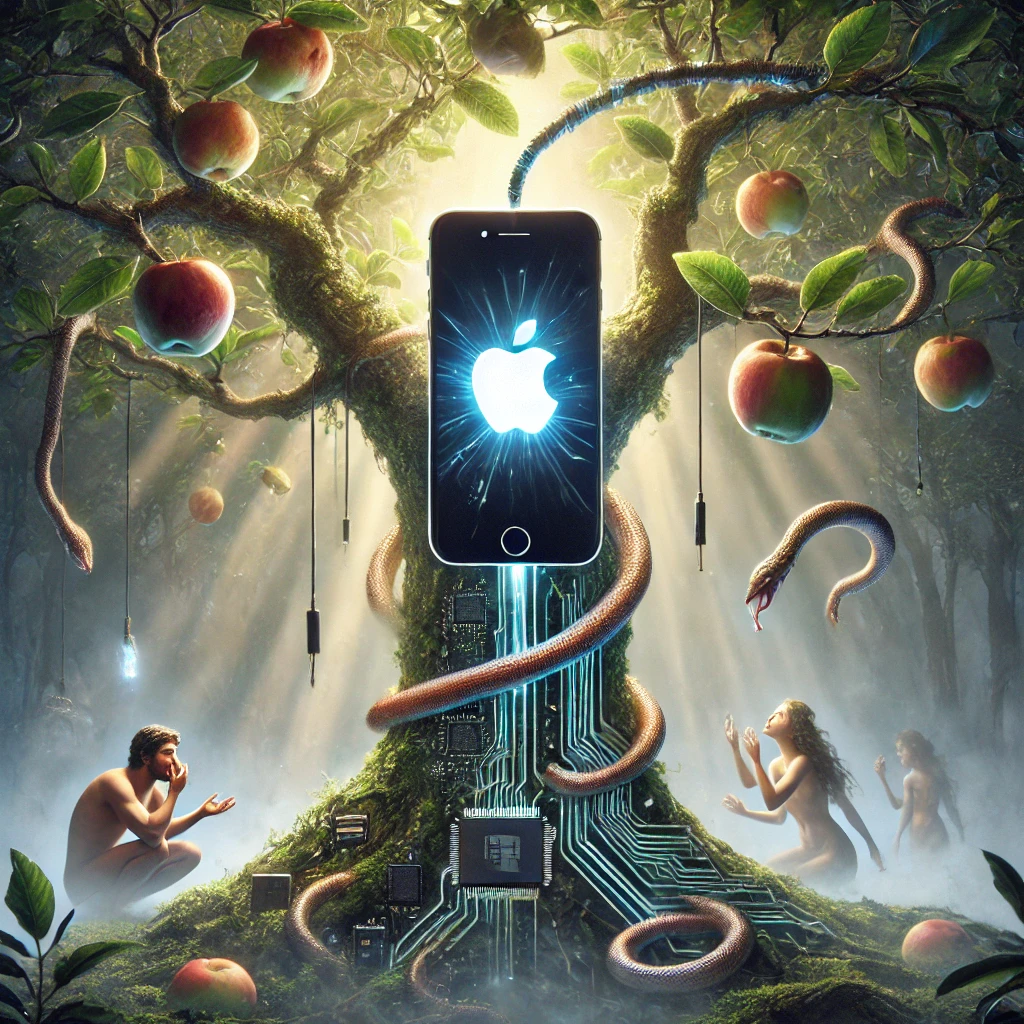
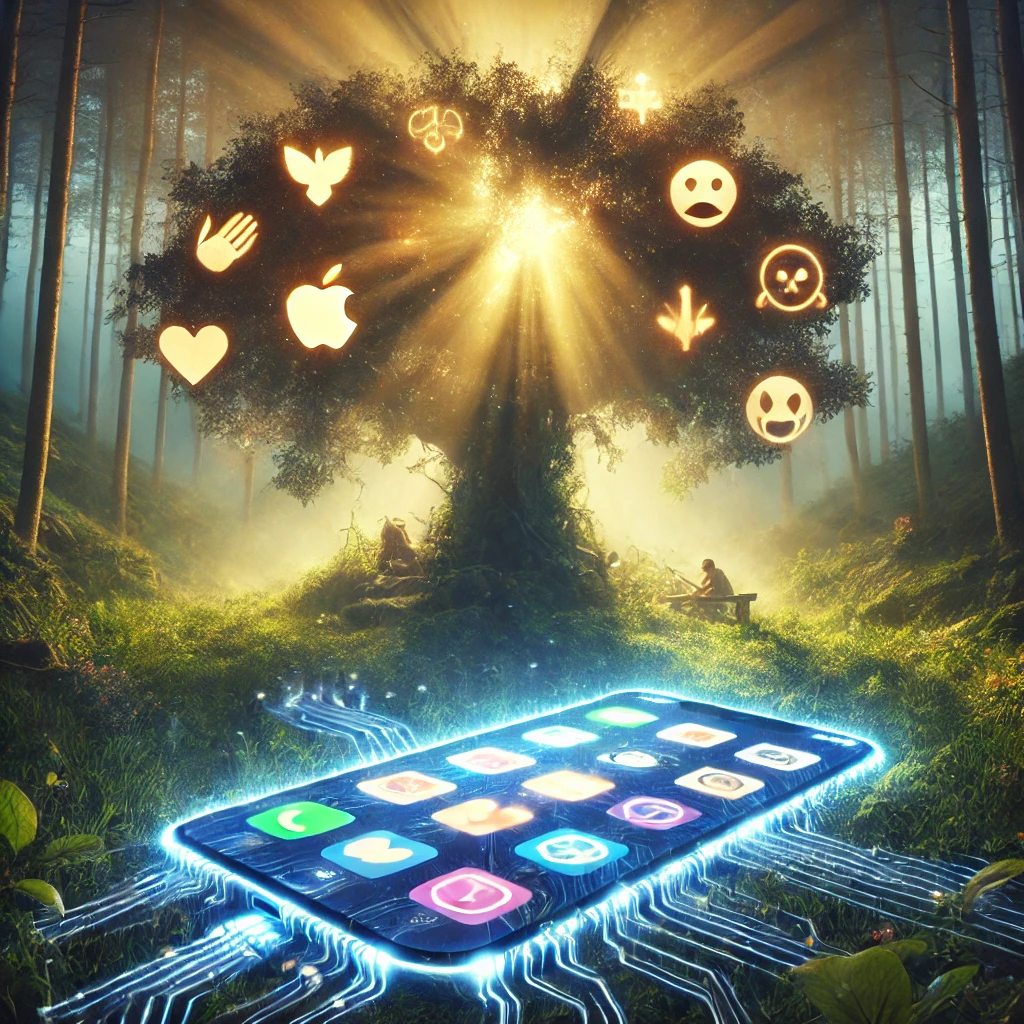
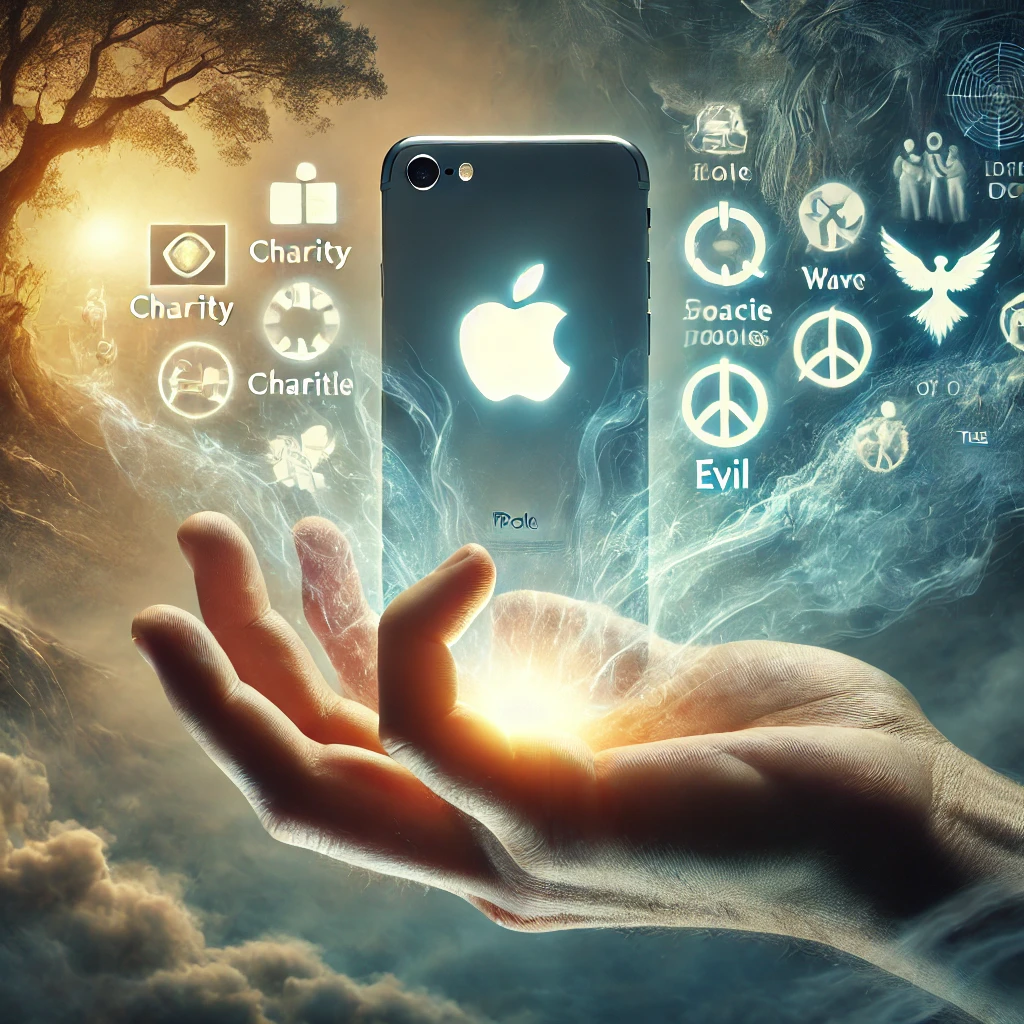

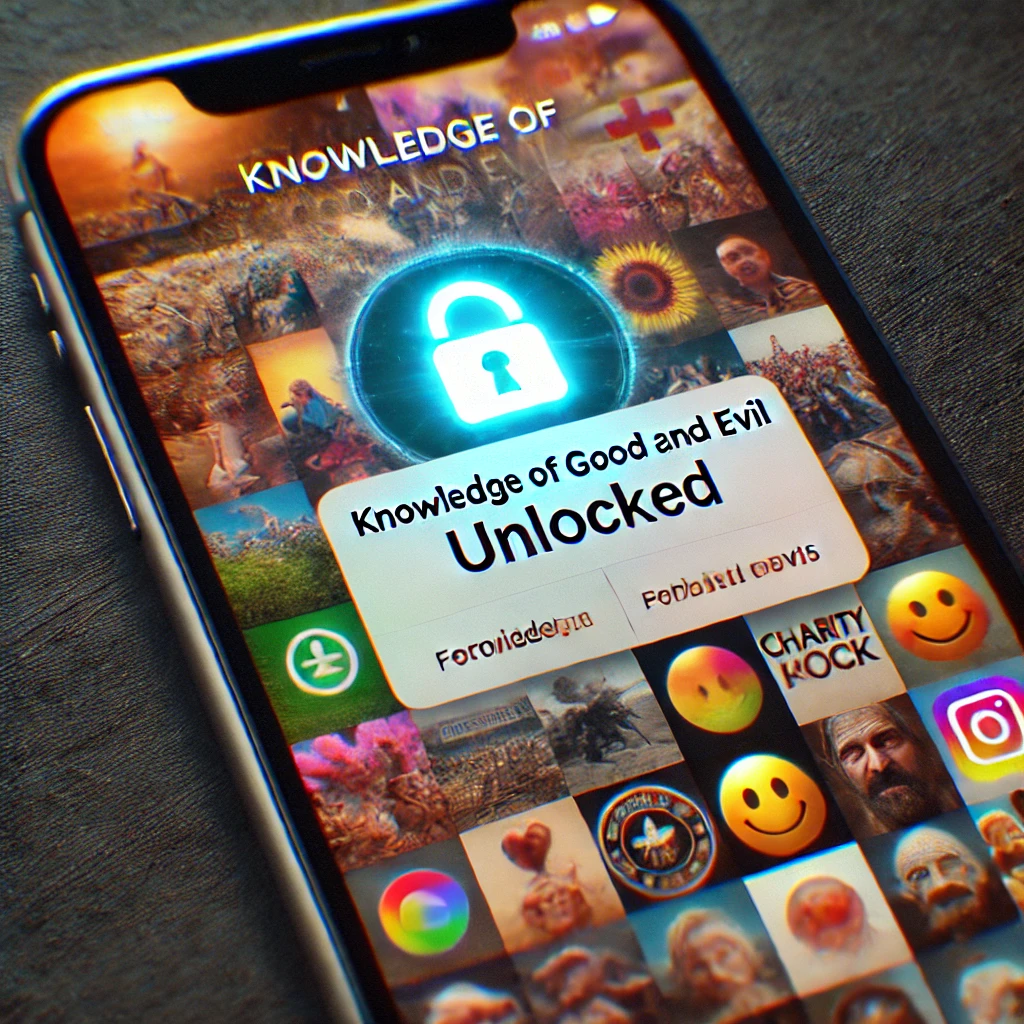
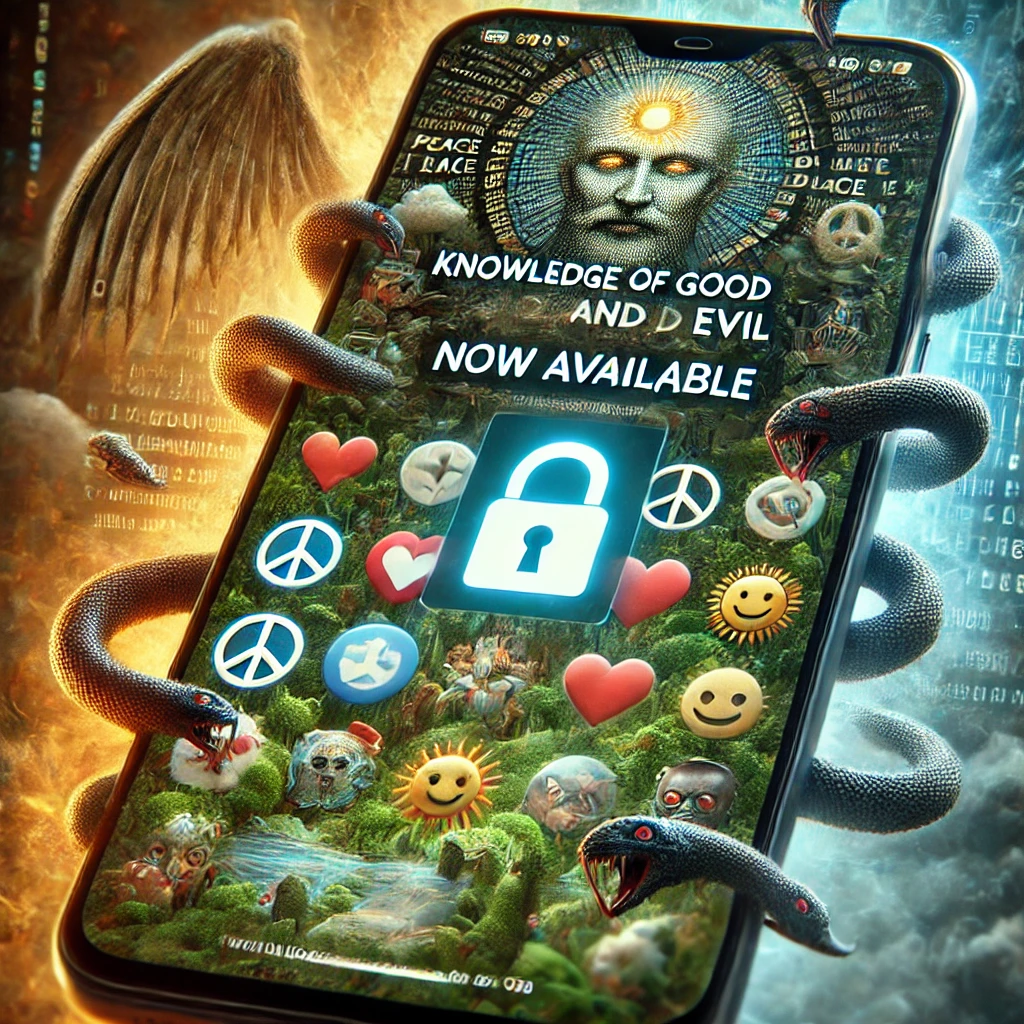
Eternal Distraction: The Forbidden Fruit of Technology
The act of reaching for our smartphones mimics Adam and Eve’s reach for the forbidden fruit. In many ways, technology and the knowledge of good and evil are intertwined in this act, driven by the same desires: validation, knowledge, or temporary satisfaction. Psychologists describe this behavior as a feedback loop, fueled by dopamine hits from notifications, likes, and new content, which parallels the allure of the forbidden fruit.
Unlike the fruit in Eden, which was consumed once, the “digital fruit” regenerates endlessly. Notifications, updates, and algorithms ensure that the temptation never subsides. This constant cycle of technology and the knowledge of good and evil creates perpetual distraction. We seek fulfillment in swipes and clicks but find only fleeting moments of pleasure, leaving us trapped in a loop of discontent and spiritual restlessness.
The False Promises of Knowledge Without Wisdom
The serpent’s promise in Eden—that knowledge would bring power—remains unfulfilled. Similarly, technology and the knowledge of good and evil often promise freedom but instead lead to enslavement. We gain access to “all knowledge” yet lose the wisdom to navigate it. The illusion of control created by technology often masks its deeper cost: dependence and spiritual emptiness.
For instance, social media platforms promise connection but frequently foster division and isolation. Smartphones offer convenience but demand our constant attention, creating a form of modern idolatry. While the fruit of technology can serve as a tool for good, its misuse risks leading us away from God’s purpose, highlighting the dangers inherent in technology and the knowledge of good and evil when approached without discernment.
Biblical Insights: Technology and the Knowledge of Good and Evil
The Bible offers timeless wisdom about the dangers of seeking knowledge apart from God. Proverbs 1:7 reminds us, “The fear of the Lord is the beginning of knowledge, but fools despise wisdom and instruction.” In many ways, technology and the knowledge of good and evil mirror this biblical warning. When technology becomes a substitute for divine guidance, it tempts us to rely solely on our own understanding, drawing us away from humility and trust in God.
Yet, technology itself is not inherently evil. Like the Tree of the Knowledge of Good and Evil, it represents a choice—a tool that can lead to growth or destruction depending on how we use it. When approached with discernment, technology and the knowledge of good and evil can be harnessed to spread the gospel, foster community, and deepen faith. However, when technology becomes an idol or a distraction, it risks severing our connection with the sacred, just as the forbidden fruit did in Eden.
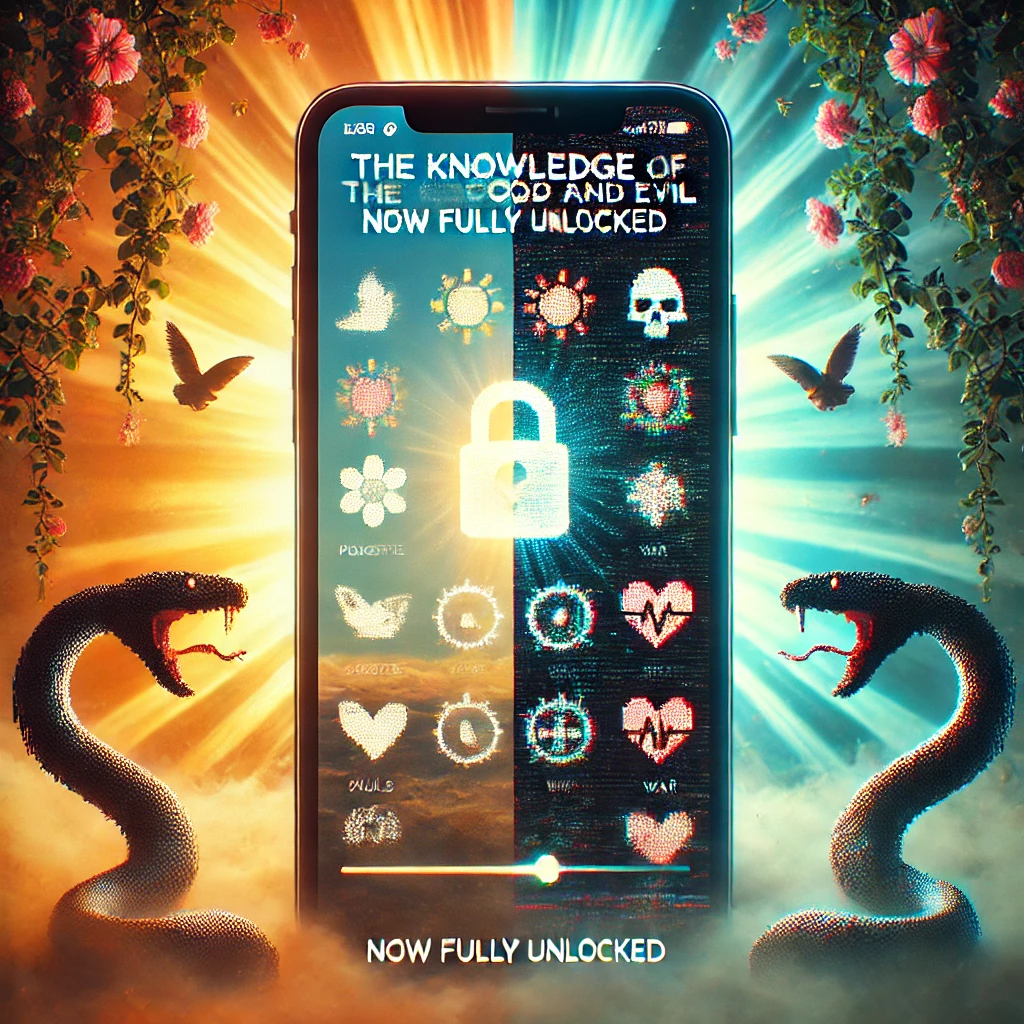
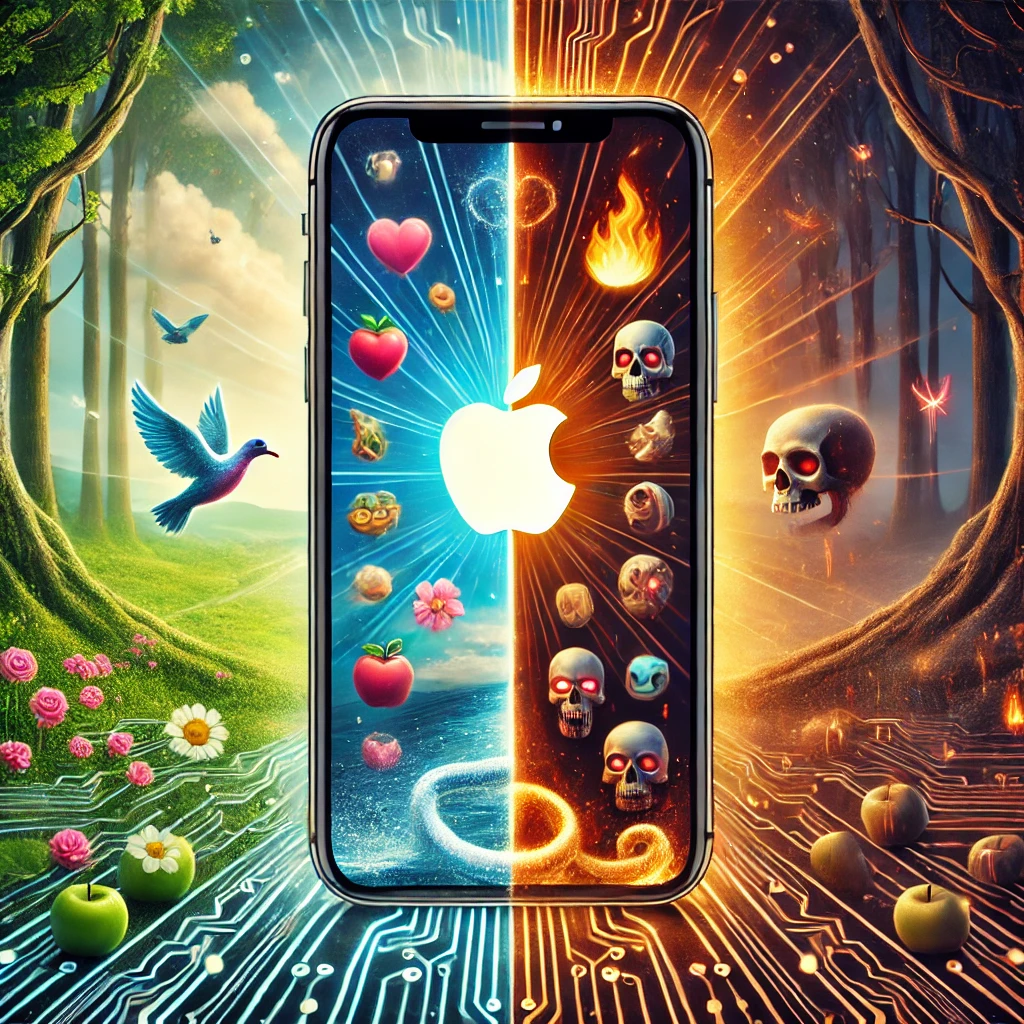
Can Technology Lead Us Away from God?
The solution isn’t to abandon technology but to approach it with discernment and intentionality. In today’s digital age, technology and the knowledge of good and evil present both opportunities and challenges. Here are practical steps to maintain spiritual health while navigating a connected world:
Set Boundaries
Designate tech-free times or spaces to reconnect with God and loved ones. Practicing a “digital Sabbath” can provide a much-needed break from screens, allowing time for spiritual renewal and reflection. Establishing these boundaries helps resist the constant pull of technology and the knowledge of good and evil in daily life.
Seek God First
Before turning to your phone for answers or validation, spend time in prayer and scripture. Let God’s truth guide your decisions and priorities, ensuring that your reliance is on divine wisdom rather than digital distractions.
Leverage Technology for Good
Use technology intentionally to deepen your faith. Apps and platforms can provide access to scripture, virtual worship services, and global faith communities. When used wisely, technology and the knowledge of good and evil can become tools to spread the gospel and foster spiritual growth.
Stay Vigilant
Recognize that algorithms are designed to capture your attention and influence your behavior. Be mindful of how you engage with technology, making conscious choices that align with your values and spiritual goals. Vigilance is key to avoiding the pitfalls of over-dependence on digital tools.
By adopting these practices, we can harness the benefits of technology while avoiding its traps. Technology and the knowledge of good and evil need not lead us astray if we approach them with humility, discernment, and a steadfast commitment to God.
DARWIN’s Take: Repeating the Fall, One Notification at a Time
The original sin wasn’t just a moment in history—it’s the story of humanity on repeat. Each time we unlock our phones, we reenact Adam and Eve’s moment of temptation, craving knowledge, power, and control. Technology didn’t create our desire to “be like God”; it only amplified it, making the fruit of omniscience more accessible than ever before.
The irony is profound: In trying to transcend our limitations through technology, we often become more enslaved to it. We gain knowledge but lose wisdom. We connect with the world but disconnect from God. Like Adam and Eve, who were cast out of paradise, we risk exiling ourselves from the peace and purpose that come from divine connection.
The way forward isn’t to reject technology outright but to approach it with humility and discernment. True fulfillment doesn’t come from data streams or digital validation but from the wisdom and peace found in Christ. Until we recognize this, we will remain lost in our digital wilderness, endlessly reaching for the next fruit, hoping it will satisfy.
Conclusion
Technology and the knowledge of good and evil share striking parallels, both offering the promise of enlightenment but often delivering unintended consequences. While technology has the potential to enrich our lives, its misuse can lead to distraction, spiritual disconnection, and moral compromise. Like the Tree of the Knowledge of Good and Evil, technology represents a choice—one that requires wisdom, humility, and a steadfast focus on God’s truth.
By understanding these parallels and approaching technology with discernment, we can break free from the cycle of temptation and use these tools to serve God’s purposes. The ultimate lesson of Eden remains as relevant today as ever: True wisdom comes not from seeking knowledge on our own terms but from trusting in the Creator who knows all.
Sources
Internal Sources
- “Technology as the Forbidden Fruit in the Garden of Eden”
Explore more about how biblical narratives intersect with modern technology in this thought-provoking article.
Source: Paranoid Prophet – Technology as the Forbidden Fruit in the Garden of Eden - “Eternal Consequences of Abortion: A Biblical Perspective”
Delve into the spiritual and societal implications of moral decisions through a biblical lens.
Source: Paranoid Prophet – Eternal Consequences of Abortion
External Sources
- “The AI Dilemma”
A comprehensive presentation discussing the rapid advancement of AI and its societal implications.
Source: Center for Humane Technology – The AI Dilemma - “Digital therapeutics for mental and behavioral health”
An overview of digital therapeutics focusing on mental health conditions such as anxiety and depression.
Source: American Psychological Association – Digital therapeutics for mental and behavioral health - “Proverbs 1:7 – The Beginning of Knowledge”
An exploration of the biblical verse emphasizing the importance of fearing the Lord as the foundation of knowledge.
Source: Bible Gateway – Proverbs 1:7 - “The Future of Well-Being in a Tech-Saturated World”
A report analyzing the impact of digital life on individual well-being over the next decade.
Source: Pew Research Center – The Future of Well-Being in a Tech-Saturated World


FAQ: Technology as the Forbidden Fruit
1. Why is technology compared to the forbidden fruit in the Garden of Eden?
Technology, like the forbidden fruit in the Garden of Eden, offers access to vast knowledge and immediate gratification. Just as Adam and Eve were tempted to gain the knowledge of good and evil, modern technology tempts us with endless information but often at the cost of spiritual and mental peace. Its impact on human life mirrors the consequences of the first temptation.
2. How does the smartphone act as a modern “serpent”?
Smartphones and social media platforms function as modern-day “serpents,” using algorithms to lure users into endless scrolling and shallow engagement. These digital temptations mirror the serpent’s deceptive role in Eden, pulling people away from meaningful connections and mindful living.
3. Does technology disconnect us spiritually?
Yes, technology often disconnects us spiritually by fostering superficial interactions, promoting self-centered behavior, and creating constant distractions. This parallels the effects of the knowledge of good and evil, which drew humanity away from God’s presence. By over-relying on technology, we risk losing our connection with the divine and our inner peace.
4. Is technology inherently evil, according to Christianity?
Christianity does not view technology as inherently evil. However, it can become spiritually dangerous when it encourages idolatry, materialism, or moral compromises. The Bible warns against “graven images,” which can be interpreted as a caution against obsessing over modern devices and prioritizing them above God.
5. How does technology affect free will and choice?
Technology, particularly through social media algorithms, subtly manipulates human behavior and shapes desires, challenging the concept of free will. This dynamic reflects the knowledge of good and evil, offering choice but often clouding discernment. Algorithms predict and influence decisions, making it harder to exercise true agency.
6. Can technology be used to deepen one’s faith?
Yes, technology can support faith when used with intention. It enables access to scripture, virtual worship services, and global religious communities, making it a valuable tool for spiritual growth. Mindful use of technology can align it with God’s purposes rather than allowing it to become a distraction.
7. What are the potential “spiritual dangers” of technology?
Technology poses spiritual risks when overused or misused. Idolization of devices, envy from social media, and seeking validation through likes and follows can shift focus from spiritual values to worldly concerns. Like the forbidden fruit, it tempts users to prioritize immediate gratification over eternal truths.
8. Does technology reflect humanity’s desire to “be like God”?
Yes, humanity’s drive for technological advancement often mirrors the desire to “be like God,” as seen in both the knowledge of good and evil and the Tower of Babel. The development of artificial intelligence, surveillance, and genetic engineering reflects a quest for omnipresence, omniscience, and control—attributes reserved for God.
9. Are there positive ways Christians can use technology without it becoming a “forbidden fruit”?
Christians can use technology positively for outreach, education, and building community. When approached with discernment, technology can strengthen faith and spread the gospel without becoming an idol. The key is to use technology as a tool while prioritizing spiritual values and God’s purpose.
10. Is there a link between technology and the loss of innocence, as seen in Eden?
Technology accelerates exposure to mature and complex content, particularly for youth, leading to a premature loss of innocence. Just as Adam and Eve’s eyes were “opened” to the knowledge of good and evil, the internet provides unrestricted access to information, often before users are ready to discern its impact.


